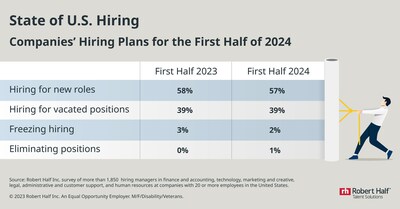Payroll
Companies Plan to Increase Hiring in the First Half of 2024
90% of hiring managers report difficulty finding skilled professionals, and 58% said it takes longer to hire for open roles compared to one year ago. Some of the top factors contributing to hiring challenges include.
Jan. 09, 2024

The job market will remain resilient heading into 2024, research from talent solutions and business consulting firm Robert Half shows. According to the company’s State of U.S. Hiring Survey, 57% of respondents plan to add new permanent positions in the first six months of the year, while another 39% anticipate hiring for vacated positions. More than two-thirds (67%) expect to hire contract workers as part of their staffing strategy.

| Companies’ Plans for Hiring Permanent Staff | ||
| First Half 2023 | First Half 2024 | |
| Adding new positions | 58 % | 57 % |
| Filling vacated positions | 39 % | 39 % |
| Not adding new or filling vacated positions | 3 % | 2 % |
| Eliminating positions | 0 % | 1 % |
Robert Half’s State of U.S. Hiring Survey: 57% of respondents plan to add new permanent roles in the first half of 2024.
View a breakdown of hiring plans by profession and city.
Company Growth Anticipated, and Projects Gain Momentum
Among managers who plan to increase hiring, more than two-thirds (66%) cited company growth as the primary factor influencing their hiring decisions for the first half of 2024. In addition, more than three-quarters (77%) of managers who had to put projects on hold in 2023 said they plan to pick them back up in the new year.
Hiring Challenges Persist
While hiring is expected to increase, finding the right talent may not be easy. According to the survey, 90% of hiring managers report difficulty finding skilled professionals, and 58% said it takes longer to hire for open roles compared to one year ago. Some of the top factors contributing to hiring challenges include:
- Finding candidates who align with the company culture (49%)
- Meeting candidates’ salary expectations (48%)
- Lack of candidates applying for open roles (42%)
“Job openings continue to exceed the number of professionals looking for work,” said Dawn Fay, operational president of Robert Half. “With hiring expected to increase early in the year, employers need to have a strategic hiring plan in order to land the talent they need.”
Companies Need a Retention Plan
While workers aren’t leaving their jobs at the same rate they were during the Great Resignation, many organizations are worried about turnover. When asked about their top concerns, 91% of managers cited retaining top talent, and 88% said they worry about keeping teams motivated and engaged.
Fay added: “While hiring will be a priority next year, managers shouldn’t lose sight of their current teams. Now is the time to prioritize employee engagement and retention to avoid turnover and loss of productivity. Routinely researching and adjusting compensation levels, offering flexible work, and implementing policies to alleviate burnout are all effective strategies.”
